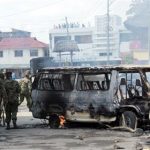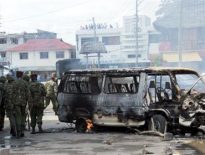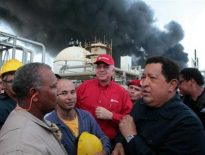(Reuters) – Russian environmentalist and protest leader Yevgeniya Chirikova had not even made it to the local election headquarters to register as a candidate on Monday before opponents ran up and showered her with fake $100 bills as she spoke to reporters.

The aim was clear: to damage her campaign to become mayor of Khimki, a town just outside northwestern Moscow, by portraying her as a tool of the United States, which President Vladimir Putin has accused of fomenting opposition to his 12-year-rule.
Chirikova, one of the leading lights of protests this year against Putin, initially looked flustered as banknotes blew around her. But she soon regained her composure and laughed as her four hecklers unfurled a U.S. flag behind her and tried to push a small Stars and Stripes into her hand for the cameras.
Chirikova – who has been detained, treated roughly by police and received threats on her and her family because of her environmental work – is undaunted by the threat of harassment as she joins an opposition campaign to chip away at Putin’s authority by challenging his party in local elections.
“The more they oppress us, the more it shows we are right to really cause them trouble,” Chirikova, 35, told Reuters before registering her candidacy in Khimki, a town of 200,000 dominated by high-rise apartment blocs.
“I fear nothing. I really don’t know what could stop me now,” she said.
Chirikova, who became one of the Kremlin’s most strident critics by organizing protests against the construction of a road through a forest near Khimki, is the most prominent opposition politician running in local polls on October 14.
Success would make little dent in Putin’s authority and that of the ruling United Russia party, but taking control of Khimki would signal that the opposition may be finally able to start building on the momentum gained in this year’s protests.
The election will also test the Kremlin’s willingness to tolerate an opposition challenge at the polls after a series of moves which the opposition has depicted as a crackdown on dissent since Putin returned to the presidency in May.
OPPOSITION TO HIGHWAY
Chirikova has burnished her opposition credentials in the past eight months, helping organize the anti-Putin protests that began last December over allegations of fraud in a parliamentary election, at times addressing the large crowds they attracted.
She sees her foray into politics partly as a continuation of her campaign to improve the environment.
“We have yellow water in our sinks, horrible traffic jams, no traffic lights,” she said. “I would like my child to be able to go to school safely. I would like to turn this city into a place where all mothers will be free of those fears.”
Her life changed when she noticed during a walk in the forest near her Khimki apartment five years ago that some of the trees had been marked for what she later learned was demolition to make way for a highway.
In what was then an unusual example of Russians taking matters into their own hands to challenge the authorities, she started protests in the forest that delayed, but did not halt, work on the road.
The number of protesters peaked at about 3,000, witnesses said, after a camp they had set up in the forest was raided by masked men.
A journalist who supported the protests and one of the protesters were badly beaten in separate incidents and left with brain damage. The culprits were never identified, and detentions were frequent at rallies against the building of the road.
Social services threatened at one stage to take Chirikova’s two children into custody, accusing her of neglect, she said.
But her protest movement established Chirikova as one of the leading voices of the opposition and is often cited by protest leaders as having played a vital role in the birth of a civil society in Russia after decades of Soviet rule.
“People realized they could only change things from below,” she said, pointing to the protests in the Khimki forest as a sign that Russians were losing their blind faith in authorities.
Her chances of success are hard to gauge as there are no independent opinion polls in an election campaign that is just starting. She won 15 percent of votes when she ran for mayor of Khimki in 2009, seven percentage points fewer than the winner.
The main electoral issues in Russia are typically economic concerns but an opinion poll released by the independent Levada research group in 2010 showed that three quarters of Khimki residents opposed the new road.
SEEKING UNITY
The Khimki election race could become another test of Putin’s readiness to tolerate dissent after a summer in which parliament rushed through several laws seen by the opposition as intended to restrict their actions – such as tightening control of the Internet, which is used to spread word of protest rallies, and increasing potential fines for protesters.
A Moscow court also handed a two-year jail term this month to three women from the Pussy Riot punk band who sang a profanity-laced song against Putin in a Russian Orthodox church, a sentence criticized as harsh abroad although opinion polls showed few Russians sympathized with the way they protested.
The Kremlin denies launching any crackdown on dissent and says it had no say in the Pussy Riot verdict. It also portrays the opposition as too disunited and short of ideas to mount a serious threat to Putin, pointing out that he won nearly two-thirds of the votes cast in the March 4 presidential election.
Kremlin sources say Putin won considerable support by attacking the West during his election campaign and accusing protest leaders of being foreign governments’ stooges.
But the opposition has already had some electoral success since the presidential poll, notably defeating United Russia’s candidate in the mayoral race in Yaroslavl, north of Moscow.
Chirikova has almost no political experience and has no political party behind her. Her chances may depend on whether she can unite parties that share her fear that Putin’s return to the Kremlin for another six years after four years as premier will stifle political and economic reform.
The liberal Yabloko party, a coalition led by former Prime Minister Mikhail Kasyanov and two other opposition leaders, and protest leader Alexei Navalny have backed her candidacy although it is not clear how far their influence goes in Khimki.
The other challengers in the election, called after the resignation of Mayor Vladimir Strelchenko, are not yet known because registration of candidates has only just begun. An official statement said only that Strelchenko had stepped aside in a routine rotation of officials. (Additional reporting by Catherine Koppel, Writing by Timothy Heritage; editing by Peter Graff and Anna Willard)





